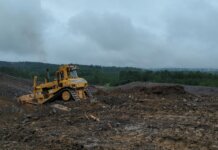
In a powerful display of collaboration and economic ambition, a delegation from Alabama recently traveled to Germany to participate in LIGNA, a world-leading trade fair for the woodworking and forestry industry. Held in Hanover every two years, LIGNA draws thousands of exhibitors and visitors from across the globe.
This year, Alabama stood out as the only U.S. state with a dedicated presence, highlighting the state’s growing reputation as a global player in the forestry and manufacturing sectors.
Representatives from the state attended the last show two years ago after a decades-long absence. That outing was successful enough for the state to return this year with a “Dream Team” of sorts, representing a cross-section of public and private interests. Members of the Alabama Department of Commerce, Alabama Forestry Commission, Alabama Industrial Development Training (AIDT), and even representatives from the state’s utilities sector came together to promote Alabama’s strategic advantages.
Their goal was twofold: to forge new international business connections and to demonstrate why Alabama is, increasingly, the place to do business.
Bringing Alabama to the Global Marketplace
“European business is very important to the state and its business environment,” says Nick Shaver, business development specialist with the Alabama Department of Commerce. “We are here to not only deepen our relationships with companies that already do business in the state, but also to identify and engage with new prospects that would be strategically positioned for success in our state.”
The primary targets for connections at LIGNA are in the forestry industry, says Shaver, since that is a large part of the state’s strategic plan. “It’s a legacy industry … one in which we think we can continue to be successful. Even though we’re cutting down a lot of trees, we have the availability of resources that these companies will need to be successful in our state.”
Alabama has more than 23 million acres of timberland, 93% of it privately owned, says Al Jones, senior forest economic development representative with the Alabama Forestry Commission. And even with the current $36 billion annual forestry industry, the state’s forests still grow an average of 2.5% a year — an advantage that other states simply can’t compete with, he adds.
The state has long been an attractive destination for wood product manufacturers, but recent years have seen a surge in interest from international firms looking for stable, business-friendly environments in the United States — and Alabama is making sure it stays top-of-mind.
And while the forestry industry is primarily being targeted at LIGNA, other industries are taking notice of the state, as well, says Shaver. “It’s been interesting here with the technology and advanced manufacturing companies we’ve spoken with. … It presents some unique economic development opportunities for us as a state.”
Public-Private Collaboration at Its Best
What set Alabama apart at LIGNA was not just the quality of its pitch, but the strength of its collaboration. The booth served as a hub where economic developers, trade specialists and utilities experts worked in tandem to answer questions, share materials and engage in targeted outreach.
“The great thing is, everybody wants to be here; everybody thinks this is a great idea; everybody thinks that working together as a team, we’re going to make more progress,” says Jones.
Questions asked at the show ranged from “What type of trees do you have?” and “What type of workforce is available?” to “What type of sites are available?” and “What do the shipping logistics look like in the state?”
“What we’re looking to do is create interest in Alabama that encourages future investment in our state,” says Joel Watts, senior project manager in economic development with Alabama Power. “Bring new jobs, bring new industry to the state that’s going to help the overall good of the state of Alabama.”
“Driving economic development to bring new jobs and investment to the state, ultimately elevating the lives of Alabamians, is our ultimate goal,” he says. “And for this industry sector in particular, it’s opportunity that we can bring throughout Alabama, but even more particularly in rural Alabama.”
Vince Perez, director of economic development for Southeast Gas, says many visitors were intrigued by the low cost of utilities available in the state. “Compared to what they may be paying here in Europe, it is a really positive selling point.”
Alabama Industrial Development Training (AIDT), the state’s workforce development agency, plays a key role in promoting Alabama’s workforce training capabilities. Known for its customized, industry-specific training programs, AIDT helps reassure European manufacturers that Alabama not only has the resources and infrastructure, but also the talent pipeline necessary to support growth.
“Every vision for economic development must be backed by a strong workforce,” says Bobby Jon Drinkard, AIDT assistant director. “Because here’s the thing: Incentives will run out. That good deal you got that only lasts for 10 years, it’s going to run out. But what will be sustainable and what will make a company proud? A well-trained and sustainable workforce. And we have it here in Alabama.”
“We let these companies know that if they come to Alabama, they will get support from AIDT through recruitment, assessments and training — at no cost to them. That’s a powerful benefit.”
All of this, combined with the state’s strategic location, access to rail and river transportation and the Port of Mobile, selling the state to international companies has proven to be easier than one might think.
“There have been plenty of times where we kind of went into a meeting thinking we would have to sell the state and the people we are speaking with are like, ‘No, no, we know about Alabama,’ so whether it’s short-term or long-term there’s definitely interest there,” says Shaver.
Global Interest, Local Impact
While the team’s presence in Germany was focused primarily on international outreach to those in the forestry industry, the implications are deeply local. New business relationships formed at LIGNA have the potential to drive job creation, support rural communities and strengthen supply chains across Alabama in various industries.
“Our single goal here is to make sure Alabama is visible and that the value proposition is presented to companies, from sawmills to equipment manufacturing,” says Thomas Tyson, PowerSouth Energy Cooperative’s economic development representative. “We’ve had good conversations with several companies and people from different countries, making those connections and selling Alabama to people that may not be familiar with us.”
“Because with everything going on — with tariffs and everything — a lot of companies are kind of rethinking and saying maybe we should have a presence in the United States,” he adds. “The unknown is what’s scary, but we feel the timing is right. We want to have these conversations now so that Alabama is on their minds when they are looking to expand.”
To that end, Alabama employs a “secret weapon” in Christoph Doerr, European office director for the Alabama Department of Commerce. “Christoph lives in Stuttgart, Germany, and helps not only with the communication side of things, but also with telling European businesses about doing business in Alabama,” explains Shaver. “He was CEO of a European company operating in Alabama and can speak from firsthand experience about the benefits of locating in our state.”
Alabama’s proactive international engagement strategy is part of a broader push to attract high-quality, long-term investments in industries that align with its natural assets and workforce strengths.
By positioning itself on the global stage, the state is making clear that it’s not just open for business — it’s ready for the future.

What is LIGNA?
Held in Hanover, Germany, every two years, LIGNA draws thousands of exhibitors and visitors from across the globe. This year’s 50th anniversary fair, held May 26-30, welcomed nearly 80,000 visitors from 156 countries to visit more than 1,400 exhibitors in the forestry, sawmilling, production, manufacturing or related craft industries.
“What makes LIGNA unique worldwide is its role as an international marketplace for the woodworking and wood processing industry,” said Dr. Jochen Köckler, CEO at Deutsche Messe AG, the show’s organizer. “This is where global supply meets international demand. With 56% of visitors coming from abroad, LIGNA clearly demonstrates that it is the undisputed world’s leading trade fair for the industry and enables global business at the highest level.”
The largest groups of international visitors came from Poland, Italy and Austria, followed by the Netherlands, France and Belgium.
Jennifer G. Williams is a Hartselle-based freelance contributor to Business Alabama.
This article appears in the July 2025 issue of Business Alabama.



